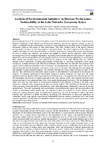Analysis of Environmental Initiatives on Business Performance Sustainability at the Lake Naivasha Ecosystem, Kenya

View/
Date
2014Author
Oribu, William Sagini
Agwata, Jones F.
George, Gongera Enock
Metadata
Show full item recordAbstract
Increasing degradation of the natural environment is one of the main threats to human survival in the long term.
Business enterprises’ environmental commitment has, therefore, become an important variable in most of
today’s competitive business environment. Activities of most enterprises are the main causes of environmental
degradation which in turn impact on their performance. This study therefore looks at the specific business
environmental initiatives and how they impact on their performance. The overall objective of the study was to
establish the impact of environmental initiatives on business performance sustainability around Lake Naivasha.
In order to achieve this objective, the research was guided by various specific objectives which included
examining forms of environmental degradation, examining environmental initiatives put in place to mitigate on
degradation, and examining effects of environmental initiatives of various business operations on social capital.
Both primary and secondary data were collected for the purposes of the study. Primary data was collected
through various instruments including questionnaires administered to individual respondents, focus group
discussions, in depth interviews and observation schedules. Secondary data was obtained from previous study
reports, articles, professional journals, various businesses’ monitoring records, annual sales reports and any other
relevant literature that the researcher came across in the course of the study. The collected data was interpreted
and analysed using discriminant analysis. The Scientific Package for Social Studies (SPSS) was used for the
analysis. The study design was descriptive survey in order to pick behaviours which needed to be mitigated for
purposes of enterprise performance sustainability. Purposive random sampling was used from the target
population which comprised of farming, hospitality and fishing sectors. For purposes of establishing the views of
the stakeholders, the officials of various organisations that have interests on the Lake Naivasha ecosystem were
incorporated into a focus group and their views were sought through group discussions. The key findings of the
study were that; the main forms of environmental degradation are nutrients discharge to the lake, water
abstraction, cutting of trees, overgrazing and green house gases effects. The implication of the findings is that
unless businesses concerned address environmental issues their performance sustainability may not be assured
going forward. The study recommends that an evaluative criteria defining the impacts that are acceptable to the
society be determined, policy bundles that are currently in place be reviewed to achieve diverse societal
objectives, strategic decisions made by organisations operating in the area be assessed in light of the actors
involved and investment in better information monitoring and enforcement of rules and regulations be
undertaken. Lastly, since specific organisational sustainability outcomes seem to consistently fail to meet broad
societal expectation, the articulation of stakeholder interests need to be considered by involving all actors in the
environmental governance process.
